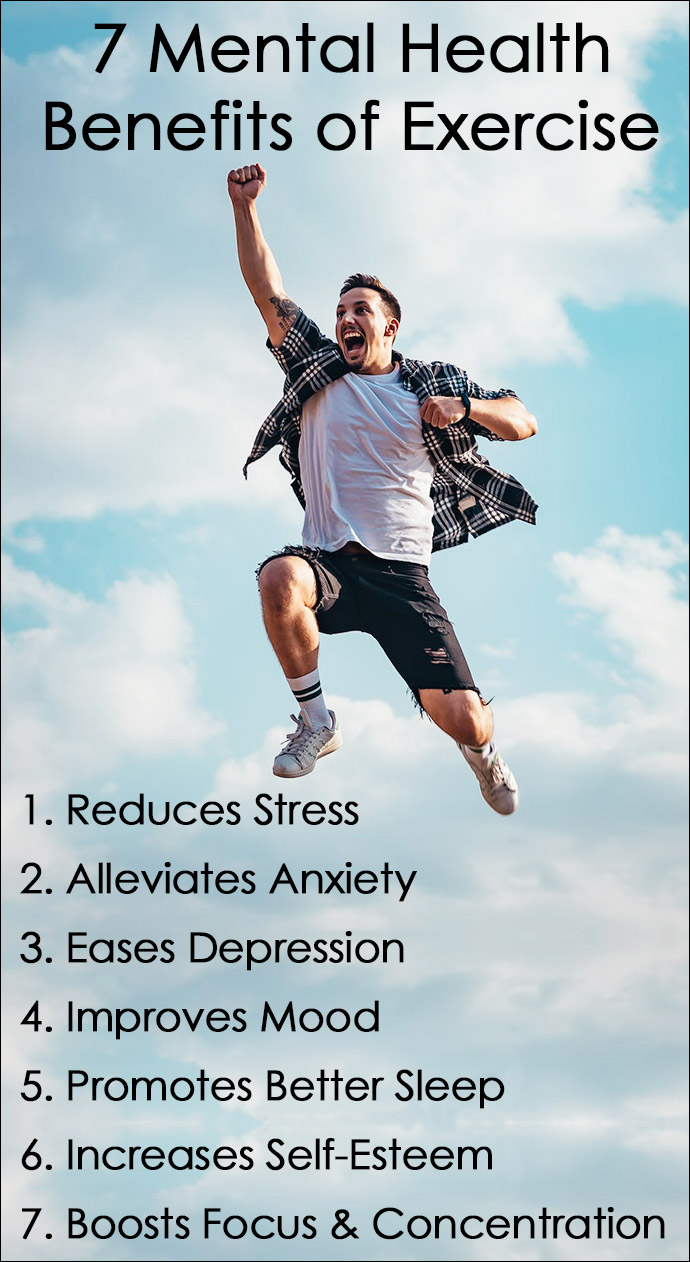Table of Contents
It’s common knowledge that regular exercise can improve a person’s physical health by helping to control weight, increase cardiovascular capacity, and strengthen the body, but what’s often overlooked are the mental health benefits of exercise.
In fact, people who exercise regularly tend to have a greater sense of mental wellbeing, more energy throughout the day, a sharper memory, better mood, and positive self-image.
What’s even more important to understand is that you don’t have to train like an Olympic athlete or someone obsessed with pushing himself or herself to the physical limit.
Even a small amount of regular exercise benefits mental health and can help lift the fog of issues like anxiety, depression, and toxic stress.
How Does Exercise Improve Mental Health?
It’s unfortunate that many patients and health care professionals do not fully appreciate the importance of exercise and mental health.
While it’s clear that moderate to intense physical activity is incredibly helpful for improving mood, scientists don’t completely understand the chemical process behind it.
When identifying how does exercise improve mental health, researchers often point to increased blood circulation in the brain and the effect it has on the body’s hormonal functions, which control our physical reactions to stress.
According to a paper published in the National Institute of Health (NIH) this process has a positive impact on the following:
- Several regions of the brain, including the limbic system, which controls motivation and mood
- The amygdala, which generates fear in response to stress
- The hippocampus, which plays an important part in memory formation as well as mood and motivation
The “why” of it all might actually be less important than the fact that exercise has proven to help people suffering from mild to very serious bouts of mental illness.
How Much Exercise is Needed to Benefit Mental Health?
It may come as a surprise to many people that the mental health benefits of exercise start with about 30 minutes a day of moderately-intense physical activity three times a week.
Moderate intensity exercise may be a brisk walk for one person, while another person with a longer history of exercise may need to hike on a manageable incline to notice the same benefits.
Research also suggests that 30 minutes of exercise doesn’t even need to be continuous. In other words, three 10-minute walks a day are believed to be just as effective for improving mental health as one longer walk.
Another thing to consider when it comes to exercise is that everyone should be able to find an activity that they enjoy. Regular exercise doesn’t have to mean training at the gym five days week. Though that may work for some people, others may not have the time or money for that, and may find that type of exercise tedious.
Finding the right activity or rotating between different types of exercise can keep things fresh and help us maintain a steady habit of physical activity.
Examples of exercise to benefit mental health include:
- Walking, hiking, or dancing
- Gardening or other forms outdoor landscaping
- Swimming or water aerobics
- Cycling or rowing
- Jogging or running
- Light to heavy weight lifting or resistance training
- Stretching or yoga
What’s most important is to find an activity that is enjoyable and we can consistently find the time to do at least three times a week for thirty minutes.
Once we incorporate a regular routine into our daily lives, we will begin to experience the many benefits of exercise on mental health.
Here are 7 Mental Health Benefits of Exercise
1. Reduces Stress
Exercise is a great way to break the cycle and symptoms of stress, such as tension in the neck and shoulders that can lead to muscle cramps and headaches.
Focused physical activity at a moderate to intense level from exercise releases endorphins in the brain that help relieve tension in the body and stressful thoughts in the mind.
2. Alleviates Anxiety
The same endorphins that help relieve stress also help to reduce our levels of anxiety. A focused physical activity is a distraction from whatever is causing our angst.
Adding a mindfulness aspect to our movements, such as concentrating on our form and how our body is responding to the exercise, helps to slow or even stop the constant flow of worry moving through our mind.
Regular exercise is often recommended as an effective way to decrease the symptoms of many types of anxiety disorders.
3. Eases Depression
Research has shown that regular exercise can treat symptoms of depression as effectively as antidepressant medication in some cases. There are number of reasons for this, such as the chemical changes that take place in the brain because of exercise.
These neurochemical changes promote feelings of calm and wellbeing that can even help prevent a relapse of major depressive disorder symptoms when done regularly. The meditative aspect of exercise also serves as a break from negative thought patterns.
4. Improves Mood
For many of the same reasons listed above, exercise helps to improve our overall mood, and this is especially true when we can get our exercise routine done outside for an added boost of the sun’s Vitamin D.
Regular exercise also improves our self-esteem and perspective on day-to-day struggles.
What is perhaps most important, though, is that exercise helps us sleep better, deeper, and more restful, which is a key factor in maintaining a positive mood.
5. Promotes Better Sleep
Whether we exercise in the morning, the middle of the day or after a long day at work, one of the biggest rewards is better sleep.
One of the reasons for this is that exercise increases the body’s temperature, which has a calming effect on the mind and can make it easier to get to sleep.
It also helps regulate the body’s circadian rhythms, which let’s us know when we’re tired and when we’re alert. If you do exercise at the end of the day, make sure there are a few hours between the time you exercise and the time you turn in for the night.
6. Increases Self-Esteem
Whether we’re starting to exercise for the first time, or if we’re returning to regular exercise, maintaining this healthy habit quickly increases our self-esteem.
This happens even when we’re not losing weight. Just getting a little bit stronger, or noticing we can walk farther or faster than before can work wonders for our self-confidence.
7. Boosts Focus and Concentration
Studies show that regular cardiovascular exercise actually creates new brain cells, a process known as neurogenesis, which leads to better brain function.
It is also a key factor in preventing cognitive decline and memory loss by keeping the hippocampus, the part of the brain responsible for learning and memory, strong and active.
Other Mental Health Benefits of Exercise
While the 7 benefits of exercise on mental health listed above all have a positive impact on the way we feel and function, there are others that also improve our daily life.
Other mental benefits of exercise include:
- Prevents cognitive decline
- Boosts motivation
- Reduces cravings for addictive substances
- Improves memory and brain development
- Enhances relaxation
- Increases energy
- Instills a sense of pride and accomplishment






